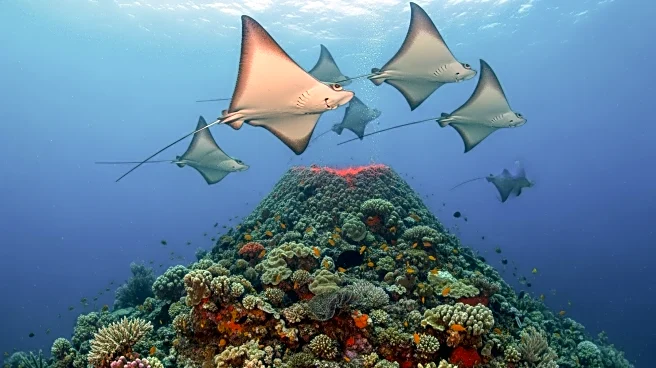What's Happening?
Researchers from Fisheries and Oceans Canada have discovered a massive nursery of giant skate ray eggs on an active underwater volcano off Vancouver Island. This volcano, previously thought to be dormant, is now known to be active, emitting mineral-rich hot water that supports a diverse marine ecosystem. The discovery was made during an exploration of a seamount rising over 3,600 feet from the ocean floor. The site revealed an unprecedented number of skate ray eggs, estimated to be in the hundreds of thousands, possibly over a million. These eggs are deposited nearly a mile below the ocean's surface, utilizing the volcanic heat to aid in their development. This finding highlights the complex interactions between geological phenomena and marine life, emphasizing the importance of conserving deep-sea environments.
Why It's Important?
The discovery of this skate ray nursery underscores the resilience and adaptability of marine life in extreme environments. The volcanic heat provides a unique habitat that facilitates the development of marine species, showcasing an evolutionary strategy that has likely persisted for centuries. This finding is significant as it highlights the potential impact of environmental threats such as deep-sea mining and climate change on these fragile ecosystems. Protecting these areas is crucial for maintaining biodiversity and understanding the complex dynamics of marine life. The discovery also offers scientists a rare opportunity to study life in extreme conditions, potentially leading to new insights into the adaptability and resilience of marine species.
What's Next?
The discovery calls for increased efforts in the conservation of deep-sea ecosystems. As threats from human activities and climate change continue to grow, there is a pressing need for responsible exploration and global cooperation to protect these natural wonders. Further research is likely to focus on understanding the full extent of life around this underwater volcano and the potential implications for marine conservation strategies. Scientists may also explore similar sites to uncover more about the mysteries of marine life and the evolutionary strategies that enable survival in such harsh environments.
Beyond the Headlines
This discovery highlights the ethical and environmental considerations in exploring and exploiting deep-sea resources. The potential for deep-sea mining poses a significant threat to these ecosystems, necessitating a balance between resource extraction and conservation. The findings also emphasize the need for international collaboration in marine conservation efforts, as the deep ocean remains one of the least explored and understood areas on Earth. The study of these ecosystems could lead to a better understanding of the planet's biodiversity and the evolutionary processes that sustain life in extreme conditions.









